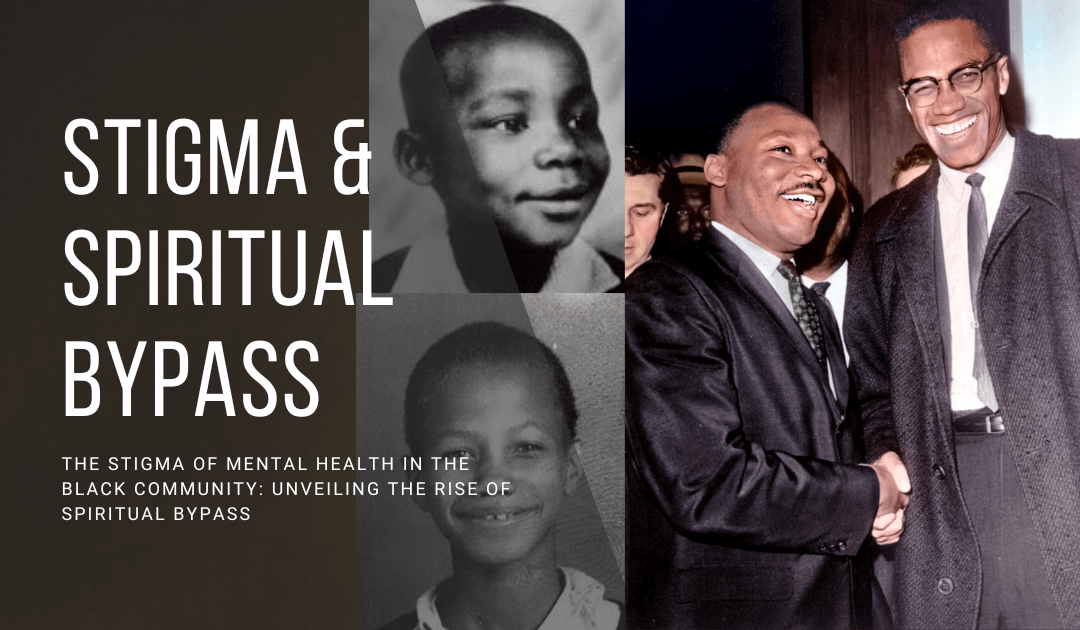Mental health is a universal concern that touches all communities; however, its stigmatization is felt more deeply in some than others.
For the Black community, seeking help has not always been safe—or even a viable option—due to the historical and systemic racism deeply embedded within the fabric of American society. I was reminded of this reality as I watched the Black History Month release of the docu-drama series “Genius: MLK/X,” which explores the formative years of Dr. Martin Luther King Jr. and Malcolm X.
This blog explores how these complicated layers contribute to the stigma around mental health in the Black community and how it has unintentionally led to an increase in spiritual bypassing as a way of coping.
Historical Context:
When it comes to the stigma around mental health in Black Americans, it’s important to take into account troubling historical stories that have contributed to distrust and systemic inequalities.
Louise Little (Malcom X):
One such instance involves the mother of Malcolm X, Louise Little, who, in the 1930s, was forcefully separated from her family and unjustly committed to an insane asylum.
This act, driven by racist motives rather than genuine concern for her mental health, serves as a stark reminder of the deep-rooted prejudices faced by Black individuals seeking support and understanding in their mental well-being.
Martin Luther King Jr.:
Similarly, the highly respected civil rights icon, Martin Luther King Jr., had a profound experience during his early years when he faced a suicide attempt after the passing of his beloved grandmother.
It’s quite unsettling that, even though there were therapeutic options available, MLK’s parents decided not to pursue them. It speaks to a common belief in the community that mental health treatment is somehow linked to weakness or failure.
Impact of Mental Health Stigma:
The stigma around mental health in the Black community prevents many people from getting the help they need. They’re afraid they’ll face discrimination or be misunderstood.
Here’s how this kind of stigma creates problems:
– Seeking Help: People often don’t get help because of cultural expectations and what society thinks. This means many suffer quietly, making it hard for them to reach out and get professional mental health support.
– Holding It In: There’s a lot of pressure to keep problems to yourself, which can lead to a harmful pattern of keeping mental health issues secret.
– Community Support Issues: The worry about being stigmatized not only stops individuals from asking for help but also makes it harder for Black communities to provide proper mental health care.
– Training Gaps in Healthcare: Many health workers aren’t taught enough about the special issues Black people face, which can lead to the wrong diagnosis or care that doesn’t fit the cultural needs.
– Historical Mistrust: There’s a deep-rooted caution against trusting medical systems because of past bad experiences. People are concerned about being treated fairly, maintaining their privacy, and having their personal stories treated with respect.
Fixing these problems means looking at them in a way that respects culture and works to break down the stigma barriers.
The Rise of Spiritual Bypass:
Many people in the Black community are searching for ways to heal emotionally, but at the same time, they don’t trust the traditional mental health system.
This has led to something called ‘spiritual bypassing’.
The phenomenon of ‘spiritual bypassing’ arises when individuals lean heavily on spiritual beliefs or practices to avoid the tough work of dealing with painful emotions, unresolved traumas, and unfulfilled personal growth. It’s especially common in environments where faith’s healing aspects are highly valued, yet there’s hesitation to engage with mental health services, a situation often observed within the Black community.
One common example of spiritual bypass can occur when an individual may rely solely on religious practices like “praying away” their emotional distress, depression or anxiety instead of seeking therapy.
While these practices can provide significant comfort and support, they may also be used to sidestep professional psychological help.
Challenges of Spiritual Bypassing in the Black Community:
The prevalence of spiritual bypassing in the Black community can unintentionally lead to several major issues. Firstly, it may delay people from seeking necessary mental health treatment due to the belief that spiritual practices alone are enough. This can result in untreated mental health conditions that only worsen over time.
Additionally, spiritual bypassing can invalidate the real psychological pain and struggles that people face, suggesting that these problems are simply a lack of faith or spiritual discipline.
Such an approach risks making feelings of guilt or inadequacy worse among those struggling with mental health issues. Furthermore, by not addressing the root psychological issues, the cycle of trauma and stress may continue, potentially affecting generations within families and communities.
It is essential to honor both spiritual coping mechanisms and the need for professional mental health support to ensure holistic healing and wellbeing.
Strategies to Break Down Mental Health Stigma in the Black Community:
To break down the stigma surrounding mental health in the Black community, we need a diverse and comprehensive approach.
Let’s take a look at a few ways this can be done:
1. Implement Community-Based Workshops: Host workshops on mental health topics, with local community members as facilitators to make it more relatable and trustworthy.
2. Engage Faith Leaders: Work together with local churches and faith-based organizations to educate about how spiritual support and professional mental health treatment complement each other.
3. Promote Mental Health Literacy: Raise awareness about mental health by running campaigns that educate people on the distinction between spiritual practices and the importance of counseling or therapy.
4. Highlight Successful Therapy Stories: Share positive testimonials from individuals within the Black community who have benefited from professional mental health care services.
5. Cultivate Peer Support Groups: Develop peer support groups within the community that provide safe spaces to discuss mental health without judgment.
6. Integrate Cultural Competency in Therapy: Encourage mental health professionals to undergo cultural competency training to better serve the Black community.
7. Provide Access to Mental Health Resources: Offer accessible mental health resources tailored to the Black community, addressing specific cultural needs and concerns.
8. Showcase Representation: Include Black mental health professionals in public health messaging to foster connectedness and representation.
9. Advocate for Policy Change: Help advocate for policy changes that break down barriers to mental health care, like insurance reform and subsidies for low-income individuals.
10. Encourage Holistic Health Practices: Highlight the importance of holistic self-care that includes both physical and mental well-being, destigmatizing mental health care as part of overall health.
Conclusion:
Destigmatizing mental health in the Black community is not just about advocacy or developing services—it’s about transforming the narrative.
There’s a pressing need to evolve from a painful past, where trust in institutions and systems was understandably eroded, to a future in which every individual can seek and receive the help they need without fear of judgment or reprisal.
To ensure the ongoing well-being and progress of the Black community, and ultimately all communities, it’s important for society to tackle these deep-seated issues.
Through compassion, understanding, and targeted action, communities can move closer to a world where the stigma of mental health belongs firmly in the past.
The conversation on this subject is expansive and ongoing, but by acknowledging history and its lingering effects, society can pave the way for more inclusive mental health narratives and effective advocacy efforts.




Thank you for sharing such valuable insights into mental health. As someone who has struggled with anxiety for years, it’s comforting to know that I’m not alone in my journey. Articles like these help break the stigma surrounding mental illness and offer hope to those who may be struggling in silence.